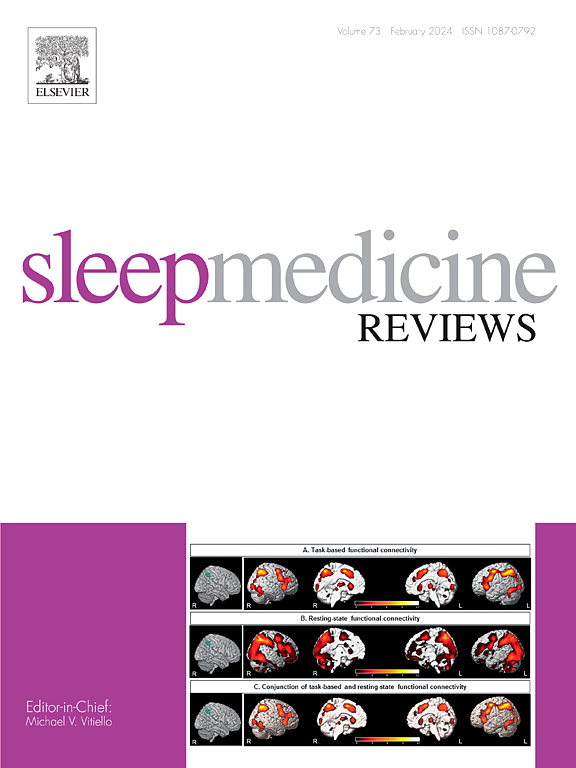Effectiveness of digital cognitive behavioral therapy for insomnia on professional activity: A systematic review and meta-analysis of randomized controlled trials
IF 11.2
1区 医学
Q1 CLINICAL NEUROLOGY
引用次数: 0
Abstract
This meta-analytic review aimed to assess the effectiveness of digital cognitive behavioral therapy for insomnia (dCBT-I) on professional activity.
We systematically explored PubMed, Web of Science and PsycINFO until August 2023. We targeted randomized controlled trials using dCBT-I and assessing professional activity. We used the standardized mean difference (SMD), and the Der Simonian-Laird random effects model, and followed the Preferred Reporting Items for Systematic Reviews and Meta-Analyses guidelines.
From the 494 papers initially identified, 11 were finally selected, including 4723 participants from Europe, Japan, and North America. People treated with dCBT-I had lower scores for work-related rumination (SMD = −3.28; 95 % CI: −6.18; −0.39), lower costs of lost productivity due to presenteeism (SMD = −0.55; 95 % CI: −0.77; −0.33), and lower presenteeism scores (SMD = −1.05; 95 % CI: −1.79; −0.31). Three studies displayed a high risk of bias, while eight were classified as “some concern”. Publication bias could not be assessed due to the small number of studies, and the certainty of evidence was low or very low.
This review provides positive results regarding the effectiveness of dCBT-I on the professional activity of people with insomnia symptoms or disorder. However, further studies are needed to reinforce our findings.
数字认知行为疗法治疗失眠对职业活动的影响:随机对照试验的系统回顾和荟萃分析。
本荟萃分析综述旨在评估数字化失眠认知行为疗法(dCBT-I)对职业活动的影响。我们对PubMed、Web of Science和PsycINFO进行了系统检索,直至2023年8月。我们的目标是使用 dCBT-I 并对职业活动进行评估的随机对照试验。我们使用了标准化均值差异(SMD)和 Der Simonian-Laird 随机效应模型,并遵循了《系统综述和元分析首选报告项目》指南。从最初确定的 494 篇论文中,最终选出了 11 篇,其中包括来自欧洲、日本和北美的 4723 名参与者。接受dCBT-I治疗者的工作相关遐想得分较低(SMD = -3.28;95 % CI:-6.18;-0.39),因缺勤而损失的生产力成本较低(SMD = -0.55;95 % CI:-0.77;-0.33),缺勤得分较低(SMD =-1.05;95 % CI:-1.79;-0.31)。三项研究显示偏倚风险较高,八项研究被列为 "值得关注"。由于研究数量较少,无法对发表偏倚进行评估,证据的确定性较低或很低。本综述就 dCBT-I 对失眠症状或失眠症患者职业活动的有效性提供了积极的结果。然而,还需要进一步的研究来巩固我们的发现。
本文章由计算机程序翻译,如有差异,请以英文原文为准。
求助全文
约1分钟内获得全文
求助全文
来源期刊

Sleep Medicine Reviews
医学-临床神经学
CiteScore
20.10
自引率
3.80%
发文量
107
期刊介绍:
Sleep Medicine Reviews offers global coverage of sleep disorders, exploring their origins, diagnosis, treatment, and implications for related conditions at both individual and public health levels.
Articles comprehensively review clinical information from peer-reviewed journals across various disciplines in sleep medicine, encompassing pulmonology, psychiatry, psychology, physiology, otolaryngology, pediatrics, geriatrics, cardiology, dentistry, nursing, neurology, and general medicine.
The journal features narrative reviews, systematic reviews, and editorials addressing areas of controversy, debate, and future research within the field.
 求助内容:
求助内容: 应助结果提醒方式:
应助结果提醒方式:


